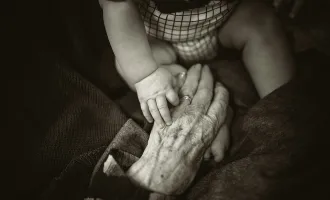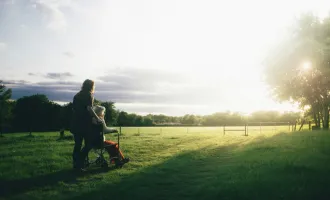
Interview with Dr. Dan Kelly, a UCSF infectious disease fellow working in Sierra Leone
With the Ebola crisis showing no signs of abating in western Africa, one of UCSF’s infectious disease fellows recently returned to Sierra Leone to assist the government as well as local health care workers in their efforts to stem the epidemic. On October 1, 2014, before he left again for Sierra Leone, Synapse’s Yi Lu sat down with Dr. Daniel Kelly to discuss his trajectory in global health, his experiences in Sierra Leone before and during the current epidemic, and his goals upon his return to the country.
Synapse: Can you talk about how you got started working in Sierra Leone?
When I was a medical student at Albert Einstein in the Bronx, I hit this roadblock of wanting to take that year off between my third and fourth year to do a Masters of Public Health, but I also badly wanted to serve people on the ground. I remember my mentor Paul Farmer [a Harvard physician and medical anthropologist] telling me that spending one year on the ground is like spending five years in school, which resonated with me and inspired me to reach out to one of my colleagues in medical school named Issa Toure, who was from Sierra Leone. He offered the opportunity for me to go to Sierra Leone and work with some of his medical colleagues.
As a medical student in Sierra Leone, I was very overwhelmed by the need but was also inspired to act. I started Wellbody Alliance with Dr. Mohamed Bailor Barrie, a Sierra Leonean physician who came out of poverty and become an incredibly passionate advocate of the poor. We started our clinic at Wellbody Alliance at a time when Sierra Leone was coming out of a ten-year civil war, and we wanted to make sure that amputated civilians were receiving the direct medical services that the government was promising them. We also saw the greater need of a country with a fragile health system that was unable to deliver basic care to people in remote villages, which was the inspiration for a number of subsequent projects such as a community-based HIV treatment and prevention program, as well as a program to reduce maternal mortality. In some ways, what we were doing was building the infrastructure that would help us respond to the Ebola crisis.
Synapse: Can you tell us about your latest trip to Sierra Leone?
I was doing my second year of clinical fellowship in infectious disease at UCSF and an MPH at Berkeley when I decided to put things on hold and go to Sierra Leone, which was about six weeks ago, I went on a shoestring with the advice and support of the Sierra Leonean Ministry of Health as well as the support of people at UCSF. When I got over there, I saw Sierra Leone like I had never seen it before, and I felt like I was entering this vacuum where there was so much help needed—the hospitals were closed, the isolation wards were abandoned and the health care workers were straining and putting their lives at risk because there was just not support for them.
Synapse: It sounds like your own clinic was closed when you went back to Sierra Leone.
I think that what hit me really hard at the time that my friend got sick was the fact that I really wanted to make sure that I understood what was going on on the ground and what kind of risk people were putting themselves in. At that point, I didn’t know anything about Ebola and frankly, I didn’t feel comfortable making decisions. As I started reading more and more, and when I understood what our health care workers were doing, I became scared for their safety and we as a leadership team discussed what was going on and made the decision that it was in the best interest of our own nonprofit not to put the lives of our friends and colleagues at risk. We made a decision to close the clinic until I could be there, I could train people and we could redesign the system as a model for the district.
Synapse: How long was Wellbody Alliance closed?
The clinic was closed for about a week and a half. We had a training, we redesigned the way we screened, triaged and referred patients from our clinic to hospitals, and then we reopened the clinic on a Monday. I can remember that there were four people identified as suspected of having Ebola, and all of those patients ended up fleeing the clinic. I went out into the community to figure out why they left and found one woman and her sick child. I videotaped this woman’s perceptions of Ebola’s prognosis and the way it was cared for in the isolation wards, and then I took this video and played it back for our own staff as an educational purview into the psychology of people they were taking care of. There was one patient who came in that first day, an amputated civilian that I’d been taking care of for the past eight years, who had Ebola. He ultimately died.
Synapse: I’m so sorry to hear that. What do you make of the international response thus far?
The bottom line is that we have a long way to go. I just want people to understand that the things that President Obama and other governments have promised, particularly the establishment of Ebola treatment units, is not enough. It’s one thing to have an Ebola treatment unit, it’s another thing to have an Ebola treatment unit that people want to go to, not to mention having a system in place that can help people to go from their homes and huts to where they can receive care.
I think in a perfect world, we have organizations that are working on a continuum of care to make sure that nobody’s left behind—those with Ebola symptoms are being accompanied all the way to Ebola units that people are proud to go to and where the patients are seeing good outcomes. They’re seeing patients get IVs and being touched by providers, which has been an issue. They’re getting high quality supportive care with good diagnostics, and they’re receiving potential treatments like ZMapp, the monoclonal antibody, which can hopefully inspire people to see treatment facilities as not just a place to die.
Synapse: Is that why you think patients are not going to these treatment facilities?
The natural palliative care response is to go home. It’s to find a comforting environment, and if I were dying, I would want to go home too. I really want to make it clear that this is not an issue of education or socioeconomic status. This issue of fear is the crux of why people are staying at home. My example is my friend, a Sierra Leonean doctor who was actually running an isolation ward at the major tertiary hospital at Freetown. When he got sick and he thought that he had Ebola, he decided to stay home. This was a highly educated, wealthy individual who knew the right thing to do was to go to the isolation ward, and even he had this stigma against it. I just want people to realize that this irrationality, whether it’s an American irrationality that Ebola is airborne or a Sierra Leonean irrationality that white people will inject them with Ebola, is associated with fear and not associated with any educational attainment or socioeconomic level.
Synapse: Is this fear driving governments to take more extreme measures such as quarantines and lockdowns?
At the end of the day, what we really need are community members that are bringing their family members to clinics and hospitals as soon as they get sick. The effect of quarantines that I saw on the ground was the response that I saw when my amputee patient that I had been taking care of for eight years tested positive for Ebola. The first thing I saw was the district health management team and the doctors at that hospital stand in a circle and talk about how they were planning to ambush the house of the patient’s family. I thought that was really sad, and I later found out that the police and the military all surrounded the house at five in the morning, and then there were a hundred people standing around and watching this all happen.
Synapse: It sounds like these are examples of how governments are adapting to the epidemic, but I was wondering if you could speak to the adaptations that people are making in their day-to-day lives.
I think that that’s somewhat of a complex answer because on one hand the country hasn’t changed much, and on the other hand it has. So you’ll hear on the media level that public outings have been banned, schools are closed, hospitals are empty, and there’s nobody playing soccer anymore, but people are still coming together to pray in mosques and churches and while you can cordon off a soccer field, you can’t stop people from hanging out on the corner of a street. From an outsider’s perspective, it almost feels like we’re not in an Ebola crisis on the ground, and that’s great in a way because people are able to still live their life, but in another way it makes it difficult from a public health perspective to control what is going on.
Synapse: When you go back to Sierra Leone, what do you hope to achieve?
In my last trip to Sierra Leone, I was very focused on creating and enacting a health worker training program and trying to rebuild systems at the clinic and hospital level so that these facilities could reopen. The one thing I understood through that experience is that the solution that’s needed is much broader, so I’m going to be working on a national level to synchronize and align our efforts with that of the government and making sure that everyone’s on the same page. I’m also going to be on the ground and helping to build our community health worker response and buttress the isolation wards so we can scale them into treatment wards
I’d like to say that UCSF has been really supportive. I can’t thank enough a number of different leaders at this institution who have really gotten behind this. I have received a lot of media attention, but this is not a one-man show, and no one person is going to solve this crisis. I need as many UCSF people involved in this as possible, and I can’t thank everyone here enough for supporting my Crowdfunding campaign, and the efforts of our team and all those who are planning on going over to West Africa in the future.


